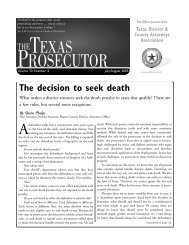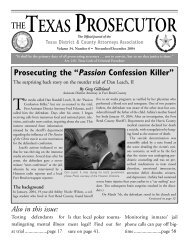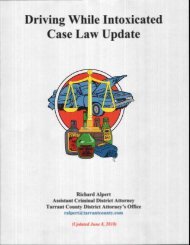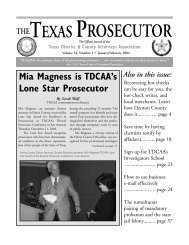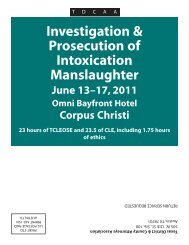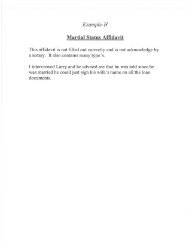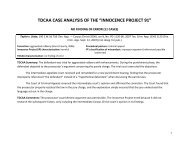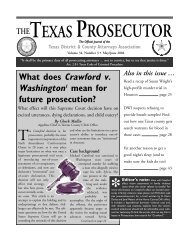Driving While Intoxicated Case Law Update - Texas District ...
Driving While Intoxicated Case Law Update - Texas District ...
Driving While Intoxicated Case Law Update - Texas District ...
Create successful ePaper yourself
Turn your PDF publications into a flip-book with our unique Google optimized e-Paper software.
6. IMPROPER ADMISSION OF EXTRAPOLATION EVIDENCE NOT<br />
HARMLESS<br />
Baqheri v. State, 119 S.W.3d 755 (Tex.Crim.App.2003).<br />
Ihis was a DWI case where extrapolation evidence was allowed in over objection. On appeal, the<br />
State conceded that the extrapolation evidence should not have been admitted. The Court of<br />
Appeals found the error to be harmful and reversed. One argument made by the Sfafe on appeal<br />
wasthatthe <strong>Texas</strong> Legislature effectively mandated that jurors engage in retrograde extrapolation.<br />
They did not agree with that argument pointing out the State did have to show breath results are<br />
relevant. The Court upheld the Court of Appeals reversal as it could not say that the erroneous<br />
admission of retrograde extrapolation testimony did not influence the jury. lt did not address the<br />
issue of whether retrograde extrapolation is needed to prove intoxication under the per se<br />
definition.<br />
7. EVIDENCE OF DRUG INGESTION STILL RELEVANT WITHOUT<br />
EXTRAPOLATION<br />
Manning v. State, 114 S.W.3d922 (Tex.Crim.App.2003).<br />
This was a manslaughter charge where fhe Sfafe alleged that one of the reckless acfs was that the<br />
defendant consumed a controlled subsfance. The only evidence of this was the presence in the<br />
blood sample of .15 mg. of a cocaine metabolite known as benzoylecgonine. The testimony attrial<br />
was this result af besf showed that some time before the accident, cocaine was ingested. The<br />
Court of Appeals felt the evidence was not compelling and should not have been admitted because<br />
the State did not extrapolate back to the time of the accident. The Court of Criminal Appeals<br />
reversed the Court of Appeals and agreed with the State that the lower Court was confusing<br />
sufficiency with admissibility. The evidence was still relevant to show cocaine had been consumed<br />
by the defendant.<br />
8. EXTRAPOLATION EVIDENCE PROPERLY ADMITTED<br />
Sutton v. State,2011 WL 3528259 (Tex.App.-Dallas 2011).<br />
All the facts in the chemist's hypothetical here were tied to characten'sfics of defendant that were<br />
introduced into evidence during trial or known to the chemist: appellant's weight, the timing of the<br />
stop, the timing and results of his breathalyzer fesf, the timing of his last drink, and the type of<br />
alcohol consumed. The breath fesfs were administered approximately an hour and a half after the<br />
offense, and the test indicates fhe fesfs were performed within three minutes of each other. The<br />
record shows no inconsisfencies or errors in the chemist's testimony concerning the retrograde<br />
extrapolation and said testimony was properly admifted.<br />
Kennedyv. State,264 S.W.3d372 (Tex.App.-Houston [1 Dist.], 2008, reh. overruled, pet. ref'd).<br />
The only information known to experts in this case on which to base their extrapolation concerning<br />
81



